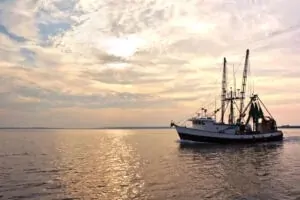WORKERS’ COMPENSATION IN THE COMMERCIAL FISHING INDUSTRY
 State workers’ compensation benefits do not normally apply to commercial fishermen.
State workers’ compensation benefits do not normally apply to commercial fishermen.
- When commercial fishermen, mariners or seamen are injured while working, they are covered for their injuries under the federal Jones Act and Federal Maritime Law.
- Insurance coverage for commercial fishermen is written by insurance carriers who specialize in this type of exposure. Coverage is more expensive for Jones Act claims than workers’ compensation insurance due to the higher risk involved.
Safety Is Constant Concern
The workforce for commercial fishing boats or fleets is normally rugged men who are often faced with difficult working conditions. Safety is a constant concern with the men looking out for each other and themselves.
The Jones Act is similar to state workers’ compensation acts in the benefits provided. It has its own lingo of “Maintenance & Cure.”
- “Maintenance” refers providing the fisherman with a daily living allowance — an indemnity benefit — until the fisherman reaches his maximum medical improvement.
- “Cure” refers to providing all necessary medical benefits, at the medical providers selected by the fisherman.
Differences Between Jones Act and Workers’ Compensation
While the Jones Act is similar to workers’ compensation in providing medical and indemnity benefits, there are differences between the Jones Act and workers’ comp.
- It is not an exclusive remedy for work-related injuries.
- If the fisherman can prove the vessel owner was negligent or that the vessel was not seaworthy, the fisherman can also file suit for:
- Pain and suffering
- Loss of future earnings
- Disability
- Cost of vocational retraining.
The Jones Act covers occupations besides commercial fishermen. Some of the other occupations covered by the Jones Act include:
- Shrimp boats
- Ferries
- Water taxis
- Divers
- Crews of riverboat casinos
- Barges and tugboat
- Tankers
- Offshore oil rigs
Transitional / Modified Duties in the Commercial Fishing Industry
Commercial fishing is the most hazardous occupation per the Center for Disease Control and accommodating restrictions in this industry can be a challenge. This industry has a fatality rate between 26 to 30 times the national average in all other industries.
The strenuous physical demands of working as a deckhand on board a ship, tug, ferry, or commercial fishing vessel, injuries can leave employees with permanent disabilities or cause physical impairments which prohibit workers from returning to their usual employment aboard a ship.
Injured crewmen should not be put back to work aboard a ship if it will compromise their safety or the safety of their fellow crewmen. Working on the deck of a ship at sea is one of the most physically demanding jobs in the world. The continued and constant stress of shipboard workplaces extreme stress on joints, bones, and muscles, leading to possible aggravation of other injuries if placed back to work in a physically demanding task. Look for tasks offsite unless the ship will be in port for a duration of time.
Many Fisherman Are Self-Employed
Many fishermen (56%) are self-employed. The larger companies can accommodate workers with net repair, ship maintenance, etc. but for smaller companies and individual owners, the transitional duty opportunities are very limited. Many fishing ships are small employers with very limited options for modified duty.
The suggestion of doing clerical work is somewhat of a stretch because usually, the boat’s captain takes care of his own paperwork, but in some cases, it may be an option. As many fishermen work on a “share the wealth” format, a member who is not doing his share would be overcompensated and would likely find ways to help, if possible. The cannery for the processing of the fish is usually owned by someone else, so light duty is probably not available there. The light duty at a non-profit may be the best option. Discuss options with your carrier/claims administrator and vendors that find alternate jobs while workers are healing.
Placement with a non-profit agency could be a very good fit for employees who are not accommodated by an employer. Work at a charitable organization will help keep the employee active and productive and not so much focused on an injury and disability.
If there is an applicable union contract, be sure to review the terms to verify modified duty is not prohibited or restricted. If it is, consider trying to negotiate it out of the contract.
Consider a restricted fisherman for:
| Clerical Work: | Assist office staff in placing orders, data entry or keeping books. |
| Net Repair: | Repair nets, assess need for repair, do quality control of repaired nets, or supervise others doing net repair while off of vessel. |
| Ship Maintenance: | If there are vessels in port, light maintenance may include sanding, painting and checking safety equipment. |
| Watch Duty: | At the base of operation, on shore, there may be opportunities for regularly scheduled shifts for security responsibilities. |

